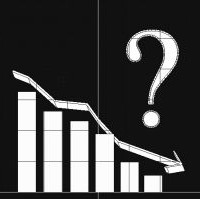Why Losses Affect Us More Than Gains and What That Means at Work

Loss aversion is a fascinating phenomenon, and one we’re all subject to. It has to do with the tendency to prefer avoiding a loss of a certain size to acquiring a gain of the same size. This means a loss of fifty dollars will make you more miserable than a gain of fifty dollars will make you happy. Or, to put it simply, we care more about losing a dollar than gaining a dollar.
According to Nobel Laureate Daniel Kahneman, this reaction accounts for why it’s sometimes so hard to take risks.
This difference in reaction to a loss and a gain reflects a cognitive bias that explains why we so often make irrational decisions, and do so repeatedly. For example, we tend to keep watching a movie that we’ve paid for even after we’ve decided we hate it. We don’t want to waste the cost of the movie by walking out. Once we’ve spent money—or time or effort—on something, we tend to stick it out, even after it’s clear that the expenditure was a mistake.
What’s more, we tend to react the same way whether it’s a fifteen dollar movie ticket, a fifty dollar casino bet, a five thousand dollar vacation, or a five million dollar project. In order to avoid that gut-wrenching feeling of loss for what’s already been spent, we plow on in an attempt to head off the loss. According to loss aversion theory, the desire to avoid losses is wired more strongly in the brain than the desire to achieve gain. It’s all about the drive to make up for losses.
If you’ve ever kept plugging away on a project that should clearly have been canceled, then you’re familiar with loss aversion on a grand scale. Instead of calling a halt to an obviously failing endeavor, management keeps it going, throwing ever more resources and money at it in hopes of a miraculous turnaround—which, of course, is unlikely to happen.
This is the part of loss aversion known as the sunk cost effect, the tendency to continue investing in something that clearly isn’t working and is never going to succeed. Humans, by the way, are the only animal in which this effect has been unambiguously observed. In organizations, of course, actions are influenced by the desperate hope not to have to go to customers and concede that what was promised can’t be delivered.
As psychologist Dan Ariely points out, loss aversion is an emotional reaction. So if you feel worse when you lose twenty dollars on a poor purchase than you feel happy when you find a twenty dollar bill on the sidewalk, now you know why.

